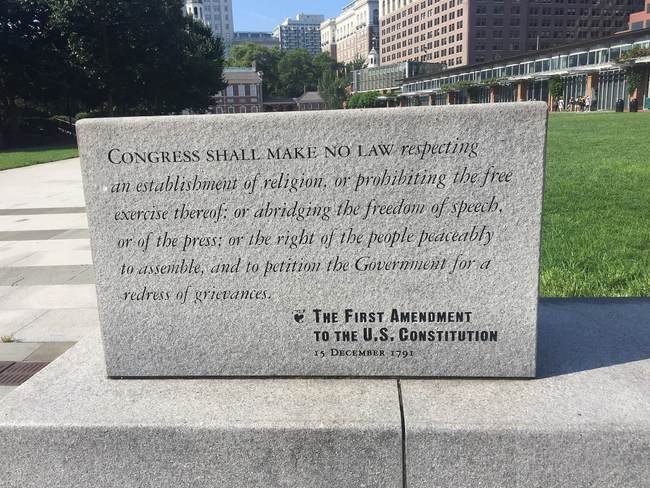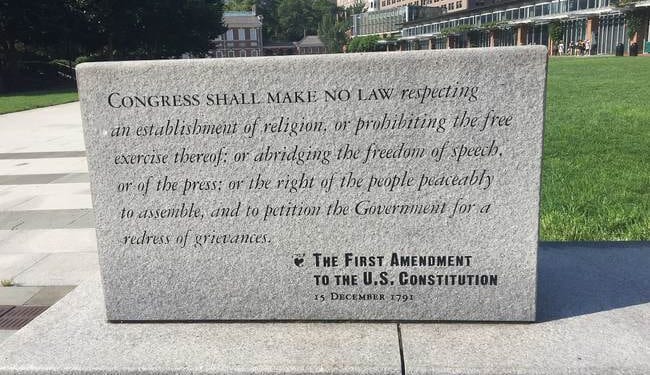
Since the assassination of Charlie Kirk, criticisms of the internet have grown and multiplied. Lies, distortion, and hate-filled statements aimed at dehumanizing and denigrating our neighbors and fellow citizens are permeating its electronic pages, creating the conditions for further acts of violence that degrade our society. Many experts have offered solutions for the situation, including prohibiting minors from accessing certain sites, limiting the hours of use, and investigating individuals who place certain language in public sites.
I am almost an absolutist when it comes to the First Amendment. Any type of restriction of speech will never limit expression equally, and it will always depend on who controls the boundaries. Still, everything needs checks and balances. In the non-internet world, possible defamation lawsuits make publishers aware and careful of repeating lies and distortions of truth. Publishing libelous accusations can result in payments of damages whether they were the creators or repeaters of the lies. Witness President Trump’s settlement victories against CBS for distorting truth by improper editing, or ABC for the words that came out of George Staphanopolis’ mouth.
Internet sites are run by big tech companies that, by law, are not deemed publishers and therefore cannot be sued for defamation. Perhaps that was a wise provision in 1996 when the internet was in its infancy, and it was primarily a scholarly endeavor. That iteration of the internet disappeared a long time ago. As we have experienced, the concept that internet platforms are an open forum is very far from the truth. Algorithms of repetition and exclusion have ripped away that fantasy with, among other things, the Hunter Biden laptop scandal, the systematic exclusion of conservative ideas, and now the distortion of Charlie Kirk’s thoughts, personality, and purpose, which directly led to his death.
Section 230 of the Communications Decency Act states that “no provider or user of an interactive computer service shall be treated as the publisher or speaker of any information provided by another information content provider.” Ironically, this section is part of a statute called the Communications Decency Act of 1996. Unfortunately, it has led to everything but civility. Perhaps I missed it, but I have not heard a call for the repeal of or amendment of Section 230, which is the legislation that gave birth to this internet problem. I believe that the answer to hate speech and the creation of false villains rests, at least in part, in changing that provision or eliminating it altogether.
Our society has created groups of people who feel disconnected, lonely, and depressed. They look around for someone to blame for their troubles and find the source of all their pain ready-made on the internet. Because advertisers are charged according to how long a person remains on a page or article, algorithms are programmed to repeat those pages increasingly. They are also programmed to repeat posts that have certain content more often. For instance, posts containing the words Hitler and Trump. The old saying in the news was “good news doesn’t sell newspapers.” That is still the case.
I could go on about how good news doesn’t sell newspapers, but I can tell you that universal truth guides law and without a profound respect for the law, there is no society. To see more about how universal truth should guide people from all different backgrounds, check out my book, Gabriel Lock: Bound by Law.
While it is true that platforms do not control everything that gets placed on their sites, they do control their algorithms, what those are instructed to eliminate, and what they are encouraged to repeat, including the frequency of repetition. It is that programming that can be justly attacked with a cause of action for defamation because it indicates a preference for certain content, and that is a publishing function. Making money cannot be placed above the accuracy of information. The death of Charlie Kirk is a testament to that. The assassin was not his neighbor, did not go to school with him, or run into him at the store. He thought he had met him on the internet. The Charlie Kirk, the alleged assassin, saw that it was distorted and vile. He was not the kind, loving husband and principled father of two children who walked away from higher education to break the isolation of a swath of a generation that is growing up lost and looking for a path through life. Having read and seen what the man stood for and what distorters claim he was, the difference is startling. The algorithms highlighted those distortions.
While we should not control the content of what is written on the internet, we can expose platforms to liability through their use of algorithms. The big tech companies should not be allowed to separate themselves from responsibility by stating that they did not know what was going on, that it was the algorithm that did it, that it was a programmer that we did not know about, or any such excuse. When the platforms encourage extremes, lies, and distortion through their algorithms, they should be liable for the damage they cause.








